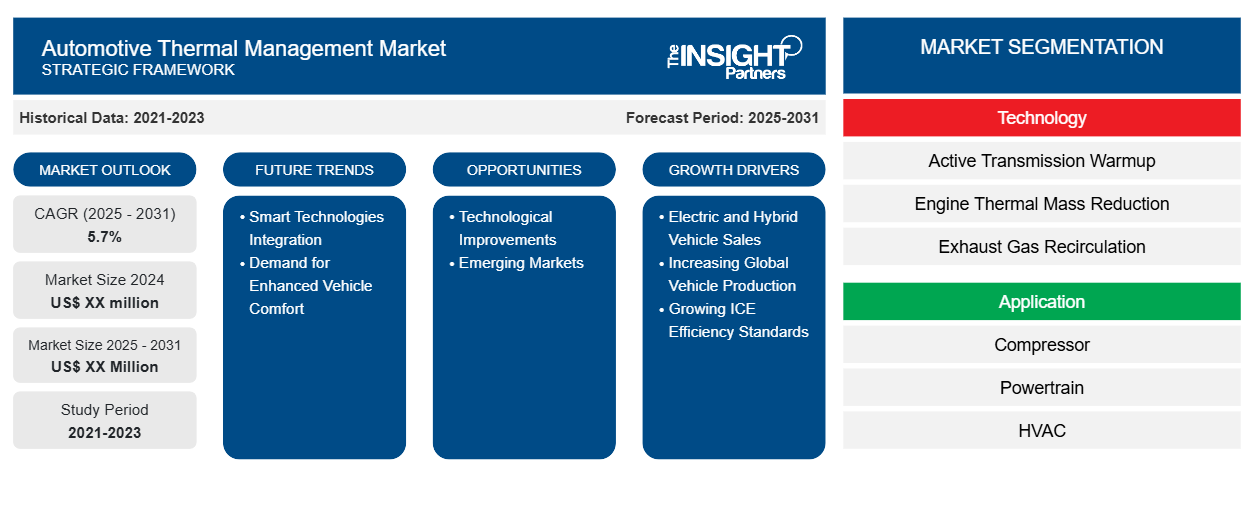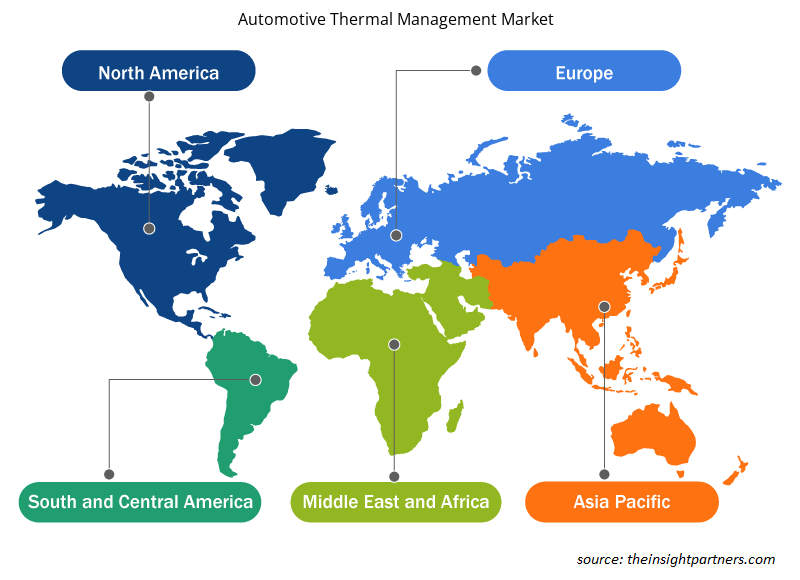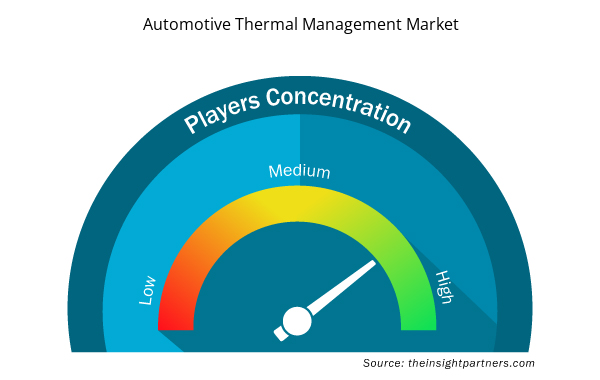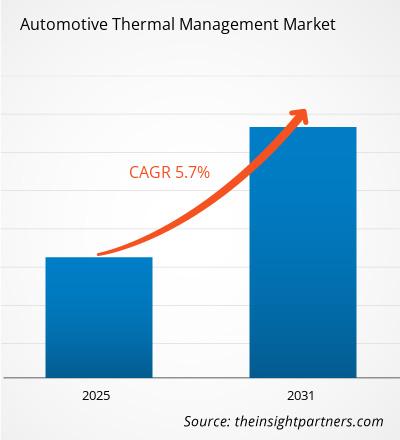The Automotive Thermal Management Market is expected to register a CAGR of 5.7% from 2025 to 2031, with a market size expanding from US$ XX million in 2024 to US$ XX Million by 2031.
The report is segmented by Technology (Active Transmission Warmup, Engine Thermal Mass Reduction, and Exhaust Gas Recirculation) Application (Compressor, Powertrain, and HVAC). The global analysis is further broken-down at regional level and major countries. The Report Offers the Value in USD for the above analysis and segments.
Purpose of the Report
The report Automotive Thermal Management Market by The Insight Partners aims to describe the present landscape and future growth, top driving factors, challenges, and opportunities. This will provide insights to various business stakeholders, such as:
- Technology Providers/Manufacturers: To understand the evolving market dynamics and know the potential growth opportunities, enabling them to make informed strategic decisions.
- Investors: To conduct a comprehensive trend analysis regarding the market growth rate, market financial projections, and opportunities that exist across the value chain.
- Regulatory bodies: To regulate policies and police activities in the market with the aim of minimizing abuse, preserving investor trust and confidence, and upholding the integrity and stability of the market.
Automotive Thermal Management Market Segmentation
Technology
- Active Transmission Warmup
- Engine Thermal Mass Reduction
- Exhaust Gas Recirculation
Application
- Compressor
- Powertrain
- HVAC
Customize This Report To Suit Your Requirement
You will get customization on any report - free of charge - including parts of this report, or country-level analysis, Excel Data pack, as well as avail great offers and discounts for start-ups & universities
Automotive Thermal Management Market: Strategic Insights

- Get Top Key Market Trends of this report.This FREE sample will include data analysis, ranging from market trends to estimates and forecasts.
Automotive Thermal Management Market Growth Drivers
- Electric and Hybrid Vehicle Sales: The sales of electric vehicles and hybrid vehicles have been growing at a very high rate, which is a key growth driver for the automotive thermal management market. Electric and hybrid vehicles require some complex thermal management techniques in order to keep the batteries in an optimal state of performance for efficiency and to achieve operation. The major cause for the growth of the automotive thermal management market is the transition from traditional ICE vehicles to EVs. Thermal management systems play an important role in the case of EVs as critical components, such as batteries, electric motors, and power electronics, are sensitive and need proper performance and a long life.
- Increasing Global Vehicle Production: Overall, the auto manufacturing is rising in countries such as the Asia-Pacific. With more volume of vehicles on the road, there is an increased demand for better systems for thermal management that can improve the engines' performance and efficiency. According to OICA, the global vehicle manufacturing in 2023 was around 93.55 million units compared to 85.01 million units in 2022. This is further driving the growth of auromotive thermal management market across different regions worldwide.
- Growing ICE Efficiency Standards: The main driver to create more advanced thermal management solutions has been the increased demand for efficient and environment-friendly ICEs. Since fuel efficiency and emission standards are ever-increasing, car manufacturers invest in thermal systems for improved engine performance with fewer emissions. As the engines are giving more power and are working at higher temperatures to have better fuel efficiency along with stricter emission standards, high-performance cooling solutions are sought for the engine, turbo chargers as well as the exhaust gas recirculation systems. Vehicle manufacturers are also developing heat recovery systems to exploit the waste heat from the engine to heat cabins or power auxiliary systems which improve the fuel efficiency.
Automotive Thermal Management Market Future Trends
- Smart Technologies Integration: Thermal management systems increasingly integrate smart technologies like IoT and AI. They make it possible to monitor as well as control thermal systems in real time so that the efficiency of the overall system in thermal management for vehicles developed under modern approaches is much better. Continuous improvement in the materials science domain is leading to the innovation of new thermal management technologies. Phase-change materials, thermoelectric materials, and high-efficiency heat exchangers provide for the thermal management solutions with greater efficiency and lightweight. New materials are now used to enhance the performance and lifespan of the EV batteries through better heat dissipation. Automotive construction with emphasis on lightweight materials, including aluminum and carbon fiber, is also driving the way for light-weight, high-performance thermal management systems in automotive applications.
- Demand for Enhanced Vehicle Comfort: Consumers are now demanding higher comfort and convenience from a vehicle, including improved climate control, heating, and cooling. In both the cabin comfort of electric vehicles and the efficiency of electric and hybrid electric vehicles, thermal management has been identified as the major opportunity for improvement. Thus, managing cabin temperatures while maintaining efficient use of the battery in electric or optimal fuel consumption in hybrid electric vehicles is critical. Energy efficiency HVAC systems, like heat pumps, are in growing demand. Manufacturers are already starting to provide advanced thermal solutions for seats, steering wheels, and many other in-car systems that personalize comfort for its users with minimal power withdrawal from the automobile's power source.
Automotive Thermal Management Market Opportunities
- Technological Improvements: There is now much better scope for innovation in more efficient heat exchangers and advanced materials for thermal management technologies. These allow for much better performance and efficiency in vehicles and could therefore stimulate interest from vehicle manufacturers looking to improve their offerings. With the ever-increasing demand for adopting electric vehicles, market demand for efficient and effective battery thermal management systems has been strong. Companies engaged in battery cooling solutions like liquid cooling systems and thermal pads are expected to reap the benefits from this trend. There is vast demand for liquid cooling systems instead of air-cooling systems because the former is somewhat more efficient in keeping their battery temperatures within the optimum operating range. Advanced insulating materials that protect electric vehicle batteries from external changes in temperature are an area in which innovations can be highly promising.
- Emerging Markets: Mature automotive thermal management systems can enjoy hectic growth periods in emerging markets. The moment these markets develop their industries, vehicle production would increase manifold, further beckoning the need for thermal management solutions to support those new vehicle productions and also to adhere to regulatory standards. As the adoption of EV is increasing globally, especially in emerging markets like China, India, and Latin America, massive opportunities are available for auto thermal management companies to enlarge their operations. Companies can also set up local manufacturing units and partnerships in emerging markets to cater to the increased demand for thermal management solutions in vehicles. Developing region-specific solutions, such as cooling systems suited for hot climates (e.g., India, the Middle East), presents opportunities for thermal management companies.
Automotive Thermal Management Market Regional Insights
The regional trends and factors influencing the Automotive Thermal Management Market throughout the forecast period have been thoroughly explained by the analysts at Insight Partners. This section also discusses Automotive Thermal Management Market segments and geography across North America, Europe, Asia Pacific, Middle East and Africa, and South and Central America.

- Get the Regional Specific Data for Automotive Thermal Management Market
Automotive Thermal Management Market Report Scope
| Report Attribute | Details |
|---|---|
| Market size in 2024 | US$ XX million |
| Market Size by 2031 | US$ XX Million |
| Global CAGR (2025 - 2031) | 5.7% |
| Historical Data | 2021-2023 |
| Forecast period | 2025-2031 |
| Segments Covered |
By Technology
|
| Regions and Countries Covered | North America
|
| Market leaders and key company profiles |
Automotive Thermal Management Market Players Density: Understanding Its Impact on Business Dynamics
The Automotive Thermal Management Market market is growing rapidly, driven by increasing end-user demand due to factors such as evolving consumer preferences, technological advancements, and greater awareness of the product's benefits. As demand rises, businesses are expanding their offerings, innovating to meet consumer needs, and capitalizing on emerging trends, which further fuels market growth.
Market players density refers to the distribution of firms or companies operating within a particular market or industry. It indicates how many competitors (market players) are present in a given market space relative to its size or total market value.
Major Companies operating in the Automotive Thermal Management Market are:
- DENSO CORPORATION
- MAHLE AUTOMOTIVE
- VALEO
- ROBERT BOSCH GMBH
- JOHNSON ELECTRIC
Disclaimer: The companies listed above are not ranked in any particular order.

- Get the Automotive Thermal Management Market top key players overview
Key Selling Points
- Comprehensive Coverage: The report comprehensively covers the analysis of products, services, types, and end users of the Automotive Thermal Management Market, providing a holistic landscape.
- Expert Analysis: The report is compiled based on the in-depth understanding of industry experts and analysts.
- Up-to-date Information: The report assures business relevance due to its coverage of recent information and data trends.
- Customization Options: This report can be customized to cater to specific client requirements and suit the business strategies aptly.
The research report on the Automotive Thermal Management Market can, therefore, help spearhead the trail of decoding and understanding the industry scenario and growth prospects. Although there can be a few valid concerns, the overall benefits of this report tend to outweigh the disadvantages.
- Historical Analysis (2 Years), Base Year, Forecast (7 Years) with CAGR
- PEST and SWOT Analysis
- Market Size Value / Volume - Global, Regional, Country
- Industry and Competitive Landscape
- Excel Dataset



Report Coverage
Revenue forecast, Company Analysis, Industry landscape, Growth factors, and Trends

Segment Covered
This text is related
to segments covered.

Regional Scope
North America, Europe, Asia Pacific, Middle East & Africa, South & Central America

Country Scope
This text is related
to country scope.
Frequently Asked Questions
Some of the customization options available based on the request are an additional 3-5 company profiles and country-specific analysis of 3-5 countries of your choice. Customizations are to be requested/discussed before making final order confirmation, as our team would review the same and check the feasibility.
The report can be delivered in PDF/PPT format; we can also share excel dataset based on the request.
The leading players operating in the Automotive Thermal Management Market include DENSO CORPORATION, MAHLE AUTOMOTIVE, VALEO, ROBERT BOSCH GMBH, JOHNSON ELECTRICS, HAEFFLER GROUP, CALSONIC KANSEI, CONTINENTAL AG, DANA INC
The Automotive Thermal Management Market is estimated to witness a CAGR of 5.7% from 2023 to 2031
Smart Technologies Integration is the key future trend of the Automotive Thermal Management Market
The major factors driving the Automotive Thermal Management Market are: Electric and Hybrid Vehicle Sales#Growing Vehicle Manufacturing
Trends and growth analysis reports related to Automotive and Transportation : READ MORE..
1. DENSO CORPORATION
2. MAHLE AUTOMOTIVE
3. VALEO
4. ROBERT BOSCH GMBH
5. JOHNSON ELECTRIC
6. SHAEFFLER GROUP
7. CALSONIC KANSEI
8. CONTINENTAL AG
9. DANA INC.
10. DUPONT

 Get Free Sample For
Get Free Sample For